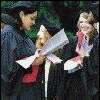 |
|
Climate Reconstruction from Subsurface Temperatures: a Global Perspective
Pollack, along with fellow researchers Prof. Shaopeng Huang at the University of Michigan and Prof. Po-Yu Shen at the University of Western Ontario, found that the earth has warmed about 1 K over the past five centuries, with more than half of that warming occurring in the 20th century. Pollack and his research group base this conclusion on subsurface temperature readings taken from more than 600 borehole sites from across six continents.
His group also based its finding on the fact that temperatures in the uppermost continental crust (or subsurface) are governed by two processes: the steady outward flow of heat from the earth's interior; and changes that occur at the earth's surface. Temperature changes that occur at the earth's surface -- heat generated from greenhouse gases, for example -- penetrate downward into the rocks beneath the surface and affect pre-existing temperatures. Thus, present-day subsurface temperatures are archives of temperature changes that have occurred at the surface in the past.
York University atmospheric science and applied mathematics Prof. Peter Taylor, who arranged Pollack's visit, says Pollack's work on subsurface temperature profiles provides especially convincing evidence of the global warming over the past few hundred years. Taylor adds that if politicians and the public allow increased greenhouse gas emissions to continue unchecked, global warming will have serious impacts on plants, animals and humans in the coming decades. "It really is time to get our heads out of the sand, and get serious," he says.
Taylor says the role of the climate scientist is to try to measure these changes, understand their causes and advise government leaders and the public of the facts. "Policy makers and the public must decide whether the short-term costs (wind and solar power, for instance, costs a little more) of reducing greenhouse gas emissions are worthwhile. They must be better informed and conscious of the likely and possible consequences of inaction. Any doubt about the serious impacts -- on plant, animal and human communities -- of climate change in the coming decades is extremely na‘ve."
Taylor adds that climate change will likely mean higher incidences of severe weather (floods, droughts, tornadoes, ice storms), changes in precipitation patterns, increases in heat stress and related health problems. "Technologically advanced countries such as Canada may adapt to the impacts of climate change; the impacts will mostly be economic -- on farming, fishing, forestry, recreation, shipping. But for more basic, agricultural economies and for many animal species -- polar bears, for example -- climate change may well be too abrupt to adapt to, and populations may starve and die."
Pollack, whose shared findings appeared in the Feb. 17, 2000 edition of Nature, serves on the editorial board of Tectonophysics and was chair of the International Heat flow Commission of the International Association of Seismology and Physics of the Earth's Interior.
For more information on Pollack's lecture, or to arrange an interview with either Pollack or Taylor, please contact:
Prof. Peter A. Taylor
Ken Turriff |
|
|
| | Welcome to York University | Latest Release | Release Archives | |
![[to York's Home Page]](../../images/yorklogos.gif)
